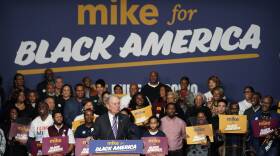EXPLORE MORE
Coming up Thursday on BPR:
NBC’s Chuck Todd
NAACP’s Michael Curry
Environmentalist Bill McKibben
Boston Globe film critic Odie Henderson
Recent segments
-
Corby Kummer: Is Kelp The New Kale?
It's taken seaweed a while to become mainstream, but Sweetgreen is trying to popularize the plant. -
Valentine's Day With Myers + Chang
The duo behind Myers + Chang and Flour Bakery spoke about their newest bakery opening. -
-
Alex Beam Reflects On Shattered $200,000 Piano
The Boston Globe columnist expressed sympathy for pianist Angela Hewitt. -
Callie Crossley On How Black Voters Are Responding To Bloomberg's Presidential Bid
Ever since a 2015 audio recording of presidential candidate Michael Bloomberg defending the controversial tactic known as stop-and-frisk resurfaced on Tuesday, Bloomberg has been playing defense. -
AG Maura Healey Seeking Damages From Juul For Allegedly Profiting Off 'Exploitation Of Young People'
Healey's office announced a lawsuit against e-cigarette manufacturer Juul for directly marketing to underage people.
Listen to previous shows
-

BPR Full Show: Orange Line Woes
Today on Boston Public Radio: We begin the show by asking listeners about the impending shutdown of the MBTA’s Orange Line. Trenni Kusinerick talks about Bill Belichick’s efforts to rebuild the Patriot’s offense, the state of the Red Sox this season, and 8-year-old twins whose father is looking for them to get the youngest possible sponsorship by the NBA. Kusnierek is a reporter and anchor for NBC Sports Boston, and a weekly Boston Public Radio contributor. Michael Curry breaks down new Massachusetts legislation concerning mental health reform, the manipulative advertising of anti-abortion pregnancy centers, a recent investigation into complaints about healthcare equity in an East Boston Neighborhood Health Center, and the recent appointment of Boston Police Comissioner Michael Cox. Curry is chair of the NAACP Advocacy and Policy Committee, and is president and CEO of the Massachusetts League of Community Health Centers. Jo Sias shares her expertise on the state of infrastructure in the face of our changing climate and extreme heat, including how climate-resilient infrastructure is more worthwhile in the long run, how politicians have tried to avoid implementing it, and why she’s optimistic for the future. Sias is a professor in the civil and environmental engineering department at University of New Hampshire, and directs the UNH Center for Infrastructure Resilience to Climate. Jared Bowen gives us the latest on the Greater Boston art scene, including the Armenian Museum of America’s exhibit “On the Edge: Los Angeles Art,” Jordan Nassar’s “Fantasy and Truth” at the ICA, MASS MoCA employees' unionization efforts , and the Pentagon’s involvement in the making of “Top Gun: Maverick.” Bowen is GBH’s executive arts editor and the host of Open Studio. John King discusses the Inflation Reduction Act and whether the tide is turning for Democrats ahead of the midterm elections, including what to look for in this week’s primaries in Wyoming and Alaska, and the fallout from the FBI raid on former President Donald Trump’s Mar-a-Lago home. King is CNN's chief national correspondent and anchor of "Inside Politics,” which airs weekdays and Sunday mornings at 8 a.m. We end the show by asking listeners if, like Rep. Liz Cheney, they would stand up for the truth even if they knew it would cost them. -

BPR Full Show: Five Second Rule
Today on Boston Public Radio: We began the show by asking listeners about the normalization of political violence in our culture. Shirley Leung discusses her reporting on the humanitarian crisis stemming from a lack of affordable housing in Massachusetts, and shared her thoughts on Boston Mayor Michelle Wu’s relationship with real estate developers. Leung is a business columnist for the Boston Globe. Arthur C. Brooks breaks down his latest columns about happiness, including how to embrace doing nothing, how to be happy in a recession and how to get out of your head by getting outside. Brooks is the William Henry Bloomberg professor of the practice of public leadership at the Harvard Kennedy School, a professor of management practice at the Harvard Business School, the happiness correspondent at The Atlantic and host of the podcast series “How to Build a Happy Life.” Corby Kummer talks about the recent interest in Italian beef thanks to “The Bear,” calls for Congress to address meat’s large carbon footprint and unionization efforts at Trader Joe’s and Starbucks. Kummer is executive director of the food and society policy program at the Aspen Institute, a senior editor at The Atlantic and a senior lecturer at the Tufts Friedman School of Nutrition Science and Policy. Revs. Irene Monroe and Emmett Price III share their thoughts on Pope Francis meeting with transgender guests of a Roman church, the Department of Justice investigating sexual abuse in the Southern Baptist Church and prosecuting local white supremacist groups. Monroe is a syndicated religion columnist and the Boston voice for Detour’s African American Heritage Trail. Price is founding pastor of Community of Love Christian Fellowship in Allston and the inaugural dean of Africana Studies at Berklee College of Music. Together, they host GBH’s All Rev’d Up podcast. Lewis Black talks about the ethos of his rant-comedy style, how the state of America has inspired his tour and what people are ranting about today. Black is a comedian who will perform at the Lowell Auditorium Sept. 16 as part of his “Off The Rails” tour. We end the show by asking listeners what they think about the five-second rule. -

Corby Kummer: Trader Joe's unions could signal the future for grocery store organizing
In July, workers at a Trader Joe’s in Hadley, Mass. successfully voted to unionize, making their location the first unionized Trader Joe’s in the country. Last week, a second Trader Joe’s in Minneapolis followed suit. The union successes come in a wave of union victories across the country, including at Starbucks and Amazon—currently, employees at a unionized Starbucks near Boston University have been on strike for nearly 30 days. “I think that it's no accident that places and businesses that made part of their brand identity treating their workers well and enjoying their workers are the ones who were being targeted because these workers got used to being treated much better than others,” food writer Corby Kummer said on Boston Public Radio Monday. Kummer added that COVID-19 and the political climate are factors in recent unionization efforts. Some companies cut benefits at the start of the pandemic, and now workers have to fight to bring them back. “So many places—meaning employers—have been much more lax and financially strapped because of the pandemic and treating their employees worse,” he said. “And also, unions are more fashionable, they've come back into popularity and worker's consciousness in a way they haven't in decades.” Kummer said that unionization efforts at stores like Trader Joe’s are more challenging than at Starbucks, because grocery stores have more employees. Still, he believes the future of Trader Joe’s unions could signal the future of grocery store unions more broadly. “I think that Trader Joe's is an important bellwether for the future, and I'm proud of Massachusetts for being the first one,” he said. Kummer is executive director of the food and society policy program at the Aspen Institute, a senior editor at The Atlantic and a senior lecturer at the Tufts Friedman School of Nutrition Science and Policy. -

BPR Full Show: A Tax-Free Weekend for a Taxing Week
Today on Boston Public Radio: Senator Elizabeth Warren talks about the MBTA, and the FBI raid on Mar-a-Lago, and took listener calls and questions on an installment of “Ask the Senator.” Retired Judge Nancy Gertner shares her thoughts on Attorney General Merrick Garland’s address on the FBI raid at Mar-a-Lago, unpacking some of the legal statutes involved in the situation. She also discussed why it’s important to our democracy to be able to trust judges, and more. Gertner is a retired federal judge and a senior lecturer at Harvard Law School. Jared Bowen talks about the latest in arts: the Met’s new exhibit “Chroma: Ancient Sculpture in Color;” Now and There’s new exhibit in front of Faneuil Hall, called “Summer Sets,” Patrick Kelly’s “Runway of Love” at the PEM, and BJ Novak’s “Vengeance;” and Leslie Dill’s new exhibition “Wilderness” at the MFA. Bowen is GBH’s executive arts editor and the host of Open Studio. Patty Bourrée explains the impact of Boston’s Drag Queen Story Hour, and how recent white supremacist protests at the events have affected him. Patty Bourrée heads Boston’s Branch of Drag Queen Story Hour. Brian O’Donovan and the Neave Trio join us ahead of their performance at the Rockport Celtic Festival to share a bit about their group and play a few songs. O’Donovan hosts GBH’s A Celtic Sojourn. The Neave trio members are violinist Anna Williams, pianist Eri Nakamura, and cellist Mikhail Veselov. We end the show by asking listeners what they think about sales tax weekend. -

BPR Full Show: All That and a Bag of CHIPS
Today on Boston Public Radio: Andrea Mitchell updates us on the latest national political headlines. Mitchell is the NBC News Chief Washington Correspondent. She is also Chief Foreign Affairs Correspondent, and anchor of “Andrea Mitchell Reports,” which airs weekdays at noon on MSNBC. Then, we open the phone lines to listeners, asking if they would consider getting rid of their manicured lawns in favor of something more natural. Andrea Cabral discusses the FBI’s search of Mar-a-Lago for classified documents. Cabral is the former Suffolk County sheriff and secretary of public safety, and former CEO of the cannabis company Ascend. Tess Gerritsen and Josh Gerritsen shares the history of humans’ complicated relationship with pigs, as told through their documentary, “Magnificent Beasts.” Gerritsen is a Maine-based author. Her and her son Josh are the filmmakers behind the new documentary, “Magnificent Beasts.” Paul Reville talks about declining school enrollment at both the high school and college levels. Reville is the former secretary of education and a professor at Harvard University’s Graduate School of Education, where he also runs the Education Redesign Lab. His latest book, co-authored with Lynne Sacks, is “Collaborative Action for Equity and Opportunity: A Practical Guide for School and Community Leaders.” Jon Gruber explains the economics behind the CHIPS and Science Act. Gruber is the Ford Professor of Economics at MIT. He was instrumental in creating both the Massachusetts health-care reform and the Affordable Care Act – and now can add the CHIPS Act to his resume. His latest book is “Jump-Starting America: How Breakthrough Science Can Revive Economic Growth and the American Dream.” We end the show by talking with listeners about harnessing feelings of envy for motivation.









